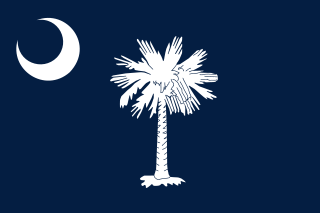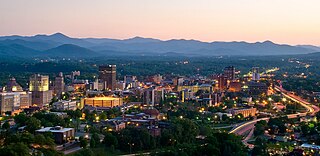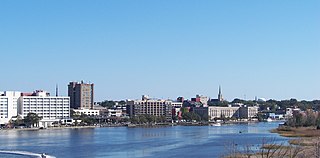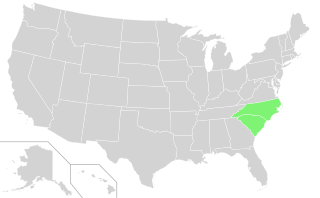
North Carolina is a state in the Southeastern region of the United States. It is bordered by Virginia to the north, the Atlantic Ocean to the east, South Carolina to the south, Georgia to the southwest, and Tennessee to the west. The state is the 28th-largest and 9th-most populous of the United States. Along with South Carolina, it makes up the Carolinas region of the East Coast. At the 2020 census, the state had a population of 10,439,388. Raleigh is the state's capital and Charlotte is its most populous city. The Charlotte metropolitan area, with an estimated population of 2,805,115 in 2023, is the most populous metropolitan area in North Carolina, the 22nd-most populous in the United States, and the largest banking center in the nation after New York City. The Research Triangle, with an estimated population of 2,368,947 in 2023, is the second-most populous combined metropolitan area in the state, 31st-most populous in the United States, and is home to the largest research park in the United States, Research Triangle Park.

South Carolina is a state in the coastal Southeastern region of the United States. It borders North Carolina to the north, the Atlantic Ocean to the southeast, and Georgia to the southwest across the Savannah River. Along with North Carolina, it makes up the Carolinas region of the East Coast. South Carolina is the 40th-largest and 23rd-most populous U.S. state with a recorded population of 5,118,425 according to the 2020 census. In 2019, its GDP was $213.45 billion. South Carolina is composed of 46 counties. The capital is Columbia with a population of 136,632 in 2020; while its most populous city is Charleston with a 2020 population of 150,227. The Greenville-Spartanburg-Anderson, SC Combined Statistical Area is the most populous combined metropolitan area in the state, with an estimated 2023 population of 1,590,636.

Charlotte is the most populous city in the U.S. state of North Carolina and the county seat of Mecklenburg County. The population was 874,579 at the 2020 census, making Charlotte the 15th-most populous city in the United States, the seventh-most populous city in the South, and the second-most populous city in the Southeast behind Jacksonville, Florida. Charlotte is the cultural, economic, and transportation center of the Charlotte metropolitan area, whose estimated 2023 population of 2,805,115 ranked 22nd in the United States. The Charlotte metropolitan area is part of an 18-county market region and combined statistical area with an estimated population of 3,387,115 as of 2023.

Raleigh is the capital city of the U.S. state of North Carolina and the seat of Wake County. It is the second-most populous city in North Carolina, after Charlotte. Raleigh is the tenth-most populous city in the Southeast, the 41st-most populous city in the U.S., and the largest city of the Research Triangle metro area. Raleigh is known as the "City of Oaks" for its many oak trees, which line the streets in the heart of the city. The city covers a land area of 148.54 square miles (384.7 km2). The U.S. Census Bureau counted the city's population as 467,665 at the 2020 census. It is one of the fastest-growing cities in the United States. The city of Raleigh is named after Sir Walter Raleigh, who established the now-lost Roanoke Colony in present-day Dare County.

North Carolina State University is a public land-grant research university in Raleigh, North Carolina, United States. Founded in 1887 and part of the University of North Carolina system, it is the largest university in the Carolinas. The university forms one of the corners of the Research Triangle together with Duke University in Durham and the University of North Carolina at Chapel Hill. It is classified among "R1: Doctoral Universities – Very high research activity".

The University of North Carolina is the public university system for the state of North Carolina. Overseeing the state's 16 public universities and the NC School of Science and Mathematics, it is commonly referred to as the UNC System to differentiate it from its first campus, UNC-Chapel Hill.

The University of North Carolina at Chapel Hill is a public research university in Chapel Hill, North Carolina. Chartered in 1789, the university first began enrolling students in 1795, making it one of the oldest public universities in the United States.

Asheville is a city in and the county seat of Buncombe County, North Carolina, United States. Located at the confluence of the French Broad and Swannanoa rivers, it is the most populous city in Western North Carolina, and the state's 11th-most-populous city. According to the 2020 census, the city's population was 94,589, up from 83,393 in the 2010 census. It is the principal city in the three-county Asheville metropolitan area, which had an estimated population of 417,202 in 2023.

Wilmington is a port city in and the county seat of New Hanover County in coastal southeastern North Carolina, United States. With a population of 115,451 at the 2020 census, it is the eighth-most populous city in the state. Wilmington is the principal city of the Wilmington, NC Metropolitan Statistical Area, which includes New Hanover, Brunswick, and Pender counties. Its metropolitan statistical area had an estimated population of 467,337 in 2023.

The governor of North Carolina is the head of government of the U.S. state of North Carolina. Seventy-five people have held the office since its inception in 1776. The governor serves a term of four years and chairs the collective body of the state's elected executive officials, the Council of State. The governor's powers and responsibilities are prescribed by the state constitution and by law. They serve as the North Carolina's chief executive and are tasked by the constitution with faithfully carrying out the laws of the state. They are ex officio commander in chief of the North Carolina National Guard and director of the state budget. The office has extensive powers of appointment of executive branch officials, some judges, and members of boards and commissions. Governors are also empowered to grant pardons and veto legislation.

The Carolinas, also known simply as Carolina, is the term for the U.S. states of North Carolina and South Carolina, considered collectively. They are bordered by Virginia to the north, Tennessee to the west, and Georgia to the southwest. The Atlantic Ocean is to the east.

The North Carolina General Assembly is the bicameral legislature of the state government of North Carolina. The legislature consists of two chambers: the Senate and the House of Representatives. The General Assembly meets in the North Carolina State Legislative Building in Raleigh.

The North Carolina Senate is the upper chamber of the North Carolina General Assembly, which along with the North Carolina House of Representatives—the lower chamber—comprises the state legislature of North Carolina. The term of office for each senator is only two years.

The Southeastern United States, also referred to as the American Southeast, the Southeast, or the South, is a geographical region of the United States located in the eastern portion of the Southern United States and the southern portion of the Eastern United States. The region includes a core of states that reaches north to Maryland and West Virginia, bordering the Ohio River and Mason–Dixon line, and stretches west to Arkansas and Louisiana.

Queen Anne's Revenge was an early-18th-century ship, most famously used as a flagship by Edward Teach, better known by his nickname Blackbeard. The date and place of the ship's construction are uncertain, and there is no record of its actions prior to 1710 when it was operating as a French privateer under the name La Concorde. Surviving features of the ship's construction strongly suggest it was built by French shipwrights, based on differences in fastening patterns in the late 17th and early 18th centuries. After several years of service by French sailors, she was captured by Blackbeard in 1717. Blackbeard used the ship for less than a year, but captured numerous prizes using her as his flagship.

The North Carolina Tar Heels football team represents the University of North Carolina at Chapel Hill in the sport of American football or Gridiron Football. The Tar Heels play in the Football Bowl Subdivision (FBS) of the National Collegiate Athletic Association (NCAA) and are members of the Atlantic Coast Conference (ACC).

This is a list of elections in the U.S. state of North Carolina.

Mark Keith Robinson is an American politician who has served as the 35th lieutenant governor of North Carolina since 2021. A member of the Republican Party, he is the first African American to hold the office of lieutenant governor in North Carolina. He is the Republican nominee for Governor of North Carolina in the 2024 election. Robinson defeated Democratic nominee Yvonne Lewis Holley in the 2020 lieutenant gubernatorial election. Robinson has promoted various far-right conspiracy theories, engaged in Holocaust denial, denied sexual assualt allegations against various prominent figures, and has often made inflammatory anti-LGBT, antisemitic, racist, anti-atheist, and Islamophobic statements.

The 2024 North Carolina gubernatorial election will be held on November 5, 2024, to elect the governor of North Carolina, concurrently with the 2024 U.S. presidential election, as well as elections to the United States House of Representatives, and various other state and local elections. Incumbent Governor Roy Cooper is term-limited and can not seek re-election to a third consecutive term in office. This is the only Democratic-held governorship up for election in 2024 in a state Donald Trump won in 2020. Primary elections took place on March 5, 2024.

















